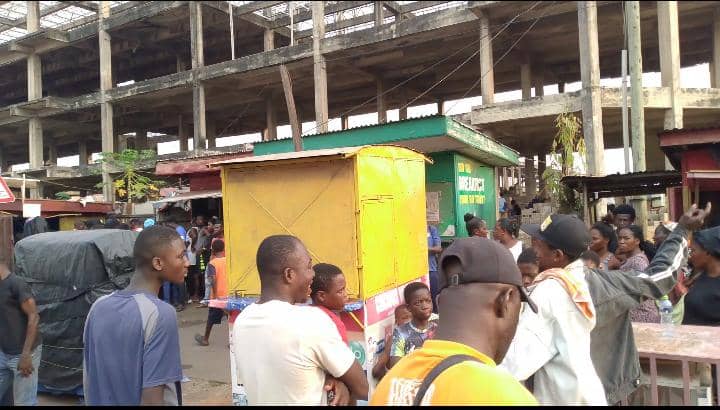ARTICLE AD
Attorney General and Minister of Justice, Dr. Dominic Ayine
In this piece, react to the Attorney General’s response to my position that Ghanaians needed to know the reason for the mass discontinuation of criminal cases. I also address the call by some NDC foot soldiers that I must apologise to President Mahama for associating him with the “clearing agent” tag and the claim that I hate the president. (Some even say I hate northerners).
1. On Monday, February 10, 2025, I wrote an article and said, “Ghanaians deserve to know the basis for the government's mass discontinuation of court cases against officials and associates of the previous Mahama administration.”
2. In my article, I agreed that some of the cases had raised questions among Ghanaians and their discontinuation did not come as a surprise, but others, especially some of the cases that bordered on corruption and financial losses to the state ought to have been completed, especially when the Mahama administration promised to recover the loot and punish those who have stolen from the public purse.
3. I titled the article “Chief Clearing Agent,” and after laying the foundation for my argument and call for answers, I explained the title of my article with the following words: “I nicknamed Akufo-Addo the Chief Clearing Agent, and Mahama seems to relish that title.”
4. My article was widely republished and discussed by many media houses under different headlines, but the above were my words, which are still on my social media pages. The government reacted, indicating it would give reasons, though some people thought otherwise.
5. Two days later, the Attorney General and Minister of Justice, Dr. Dominic Ayine, held a press conference and gave the reasons for discontinuing the cases. I do not agree with some of Dr. Ayine’s reasons for discontinuing some of the cases (which I’ll address elaborately), but I must admit that he earned my respect and the respect of many Ghanaians. He departed from a popular view in the legal fraternity that the Attorney-General does not owe an explanation for filing to discontinue cases, a view which has the blessing of the Supreme Court.
6. This action by the Attorney General further signals a pleasant departure from our immediate past, and credit should also be given to President John Dramani Mahama. In my recent open letter to the president, I indicated that “the air of our national discourse since you took over two weeks ago appears to have been purified from the toxicity of oppression, nepotism and impunity with which our nation was polluted in the longest eight years of the Fourth Republic.” We have been used to the government acting with impunity and ignoring our concerns, but it seems the Mahama government is prepared to listen and engage, and this was a classical case.
7. A week earlier, I had been moved by the reaction to my recent article directed at the Greater Accra Regional Minister, Linda Ocloo. In that strongly worded article, I expressed my disapproval of the minister’s announcement of her partnership with Jospong and Zoomlion, which have enjoyed a monopoly over national sanitation contracts but have failed to deliver. In the past, I would have received an angry call or text message from the sector minister, but Linda Ocloo didn’t do that. She reached out to me and said she had read my piece and taken note of the concerns I had raised. Taking note and acting on them are different things, but it was heartwarming to know that our leaders are now prepared to listen, a commendable trait John Mahama has shown since his first term.
8. In my article demanding an explanation for the mass discontinuation of cases, I have received varied reactions. Some argued that the Attorney General owed Ghanaians no explanation. NDC party foot soldiers went berserk because I had associated President Mahama with the “clearing agent” tag, a name Mr Mahama had called President Akufo-Addo while he was in opposition. I have also received great feedback from some notable Ghanaians, who said I had spoken their minds. Like me, they were worried about the mass and unexplained discontinuation of criminal cases.
9. Before the Attorney General’s response, others had also written opinions that countered my disagreement with the discontinuation of the cases. One notable opinion was written by the respected Ghanaian public intellectual, Professor Stephen Kwaku Asare, known on social media as Kwaku Azar. A major argument from that piece has been the same argument advanced by many foot NDC soldiers and the presidential spokesperson, Shamima Muslim. They argued that the NPP administration was in court for eight (8) years and that the failure to secure convictions showed the frivolity of the cases. Kwaku Azar wrote: “If a case has been in court for nearly a decade without a conviction, it is reasonable to ask whether the evidence was ever strong enough to meet the legal threshold.” This argument is flawed in logic and fact.
10. The NPP administration did not have these cases in court for eight years. The Stephen Opuni and the Cocobod case, about the longest of the cases discontinued, was not up to six years in court when the NPP administration lost the 2024 election and exited office. The Saglemi Affordable Housing case involving Collins Dauda was filed on July 30, 2021, and by December, when the NPP lost the election and started handing over their files, the case had been in court for three years and five months. In Ghana, where some cases have been in court for 20 years, that isn’t too long a time to render a case invalid.
11. Even if the cases had gone on for eight years, that was not the basis to question the solidity of the evidence. If the NDC wins the next election and spends eight years in office, the Attorney General will leave office with some of his cases still pending. And we cannot conclude that he’s incompetent or engaged in witch-hunting. The Attorney General can only determine when he begins a prosecution. He cannot determine when the prosecution will end. I was one of those who questioned why the courts were speeding up the prosecution of political cases while others were slow. We also witnessed the filing of many applications challenging processes in the Cocobod trial. The defendants needed to be heard by the Supreme Court, while the substantial matter was delayed. We cannot blame the Attorney General for this.
12. Kwaku Azar, whose article was used to counter mine, had to abandon a case he filed at the Supreme Court challenging the constitutionality of President Akufo-Addo’s to force the Auditor General to proceed on leave. He discontinued the case because it was delayed unduly. Like the Attorney General in the cases being discontinued, it was not Kwaka Azar’s fault that the case was delayed. The delay did not mean he lacked evidence or basis to secure a favourable verdict. In fact, some civil society organisations that filed and stayed on the same issue secured a favourable verdict from the Supreme Court, a verdict that favoured Kwaku Azar’s contention. Our judicial process travels at the pace of wounded snails. That cannot be a reason to doubt evidence or discontinue cases.
13. On the Attorney General’s justification for dropping the cases, I agree with some of them. In some cases, I do not have adequate facts or knowledge of the cases to disagree, while in others, I disagree with him.
14. In the case of Ato Forson and the ambulance procurement, I said in my write-up that I had investigated and produced a documentary on that procurement and wondered why those who awarded and executed the contracts had not been charged. If I were the Attorney General, I would have discontinued the Democracy Hub prosecution. I would have discontinued the treason case against Oliver Barker Vormawor. I agree with his reasoning regarding the Ofosu Ampofo case.
15. Of the explanations I was not convinced or disagreed with, the Collins Dauda and the Saglemi Affordable Housing case stood out. In that case, two former Ministers and three others were charged with 52 counts of Wilfully Causing Financial Loss to the Republic, Intentionally Misapplying Public Property, Issuing False Certificates, and Dishonestly Causing Loss to Public Property.
16. In the widely publicised case, the government had borrowed $200 million in 2012 to build 5000 affordable houses. The cost included consultancy and the actual building. The money was spent, but only 1506 housing units were built. The housing units built were not even completed, and we are told the country needed another $100 million to complete the 1506 housing units.
17. The fact sheet of the case said: “Even though a total amount of $196,428,891.66 has been spent on the Saglemi Affordable Housing Project, with the contractor having been paid $179,904,757.78, investigations revealed that the cost of works executed on the site, including consultancy services, is about $64,982,900.77. Only 651.75 acres of land out of the 2,172 acres of land made available by the MWRWH to the contractor for the project has been developed.”
18. In his reason for discontinuing the case, the Attorney General said: “The second reason why I dropped the charges in some of the cases, as I stated above, is that the charges were defective and, upon careful scrutiny, were filed against the promptings of plain commonsense. In the case of the Republic v. Collins Dauda & Others, for instance, the first accused was charged with misapplying public property (funds) in the sum of Two Hundred Million United States Dollars (USD200million).
“In laying the charges, the prosecution failed and or neglected to take account of the basic fact that it was part of that US$200m that was used to construct the houses at Saglemi. In other words, the value of that built environment is, in my opinion, a key determinant of how much of the total sum was allegedly misapplied by the Honourable Collins Dauda. Discounting the value of the built environment renders the charge defective.
“The prosecution in this case also failed and or neglected to take account of payments that were made by other Ministers who took office after the Honourable Collins Dauda. For instance, the Honourable Atta Akyea, as Minister of Works and Housing, approved a payment to the tune of US$ 5 million in 2017. That ought to have been considered in determining the value of state funds that the Honourable Collins Dauda had misapplied.”
19. I disagree with the Attorney-General’s reason for dropping this case. I’m not a lawyer, but as the Attorney General alluded to common sense, his reason is worth subjecting to that test:
The fact sheet of the case said: “On 27th February 2014, the 1st accused [Collins Dauda] who had assumed office as the new Minister for MWRWH, without any parliamentary approval, reviewed the original EPC and signed the First and Restated Agreement with Construtora OAS, represented by its Executive Chairman, the 4ht accused. In the process, he changed the scope of works and the application of the $ 200 million approved by Parliament for the construction of 5000 housing units. This new agreement required the contractor to execute the project in three phases over a site of 1,272 acres whilst the $200 million was now to be applied towards the execution of only the first phase of the project comprising just about 1502 housing units. This was contrary to the executive and parliamentary approvals as well as the Facility and Escrow Management Agreements.” My understanding is that since the agreement was altered, the $200 borrowed was going to be applied (or misapplied) for 1502 housing units and not the 5000 units in the initial agreement approved by the parliament and the executive whoever acted or disbursed the funds after Collins Dauda was bound by Collins Dauda’s agreement. But that is not the only reason I disagree with the Attorney General. The “misapplication” charge the Attorney General faulted was only one count. Granted that it was defective, does that also invalidate the other 51 counts with different particulars of offences? Collins Dauda also faced three other charges, namely Wilfully Causing Financial Loss to the Republic, Issuing False Certificate, and Dishonestly Causing Loss to Public Property. So, if one charge failed the commonsense test, how about the rest? If Collins Dauda was wrongly charged, how about the other four accused persons? Why were they not allowed to the four charges and tens of counts against them? Does a single count against Collins Dauda, even if we agree it was defective, render the charges against the other persons invalid? Finally, nobody has argued against the fact that Ghana lost money in the Saglemi housing project. The $200 million we borrowed would be repaid with interest. We got only 1506 partially completed housing units instead of 5000 fully completed units. At every material moment, ministers and chief directors were responsible for the expenditure and disbursement of the funds. Granted that the former Attorney General made mistakes, couldn’t the charges be amended so that the persons involved would answer for their roles? If we move on and allow the $200 million to go to waste without anybody answering for it, what message are we sending to others who occupy public office?CALL FOR APOLOGY TO PRESIDENT MAHAMA
20. The Attorney General also said he took responsibility for discontinuing the cases and that the president did not ask him to do so. Based on this, some NDC foot soldiers have called me to apologise to President Mahama over the “chief clearing agent” tag. I stand by the context in which I used the tag, and I owe the president no apology.
21. It will be difficult to accept the explanation that the Attorney General acted alone and proceeded to discontinue these high-profile cases without consulting and getting the green light from President Mahama, who appointed him. I can’t accept that.
22. When candidate Mahama called President Akufo-Addo a clearing agent, President Akufo-Addo insisted that he did not clear the appointees and that they had been investigated and cleared by state institutions. We didn’t buy that from President Akufo-Addo and cannot be forced to buy that from President Mahama. The buck stops with the president, so Mahama cannot take credit for the ultimate good in his administration and run away from the bad.
23. I insist that the mass discontinuation will hamper his own anti-corruption effort because if the next administration comes and clears unresolved cases, we will be used to a bad precedent.
HATRED FOR PRESIDENT MAHAMA
24. My article has also ignited accusations from NDC foot soldiers that I hate President Mahama. President Mahama and those close to him know we are friends. In fact, I cannot hate him. I’m just doing my work.
25. In my book, “The Fourth John: Reign, Rejection & Rebound,” I recounted my admiration for Mr. John Dramani Mahama even before he became president. I said I voted for him in 2012 because of that admiration. When he became president, I was about the most critical journalist of his admiration. That wasn’t hatred. I didn’t like his leadership, but he is a true gentleman, and I like him for that. Surprisingly, some NPP sympathisers accused me of hating Akufo-Addo just because I was critical of his administration, as I had been in the Mahama era.
26. In Mahama’s eight years as opposition leader, I was one journalist who publicly praised his tolerance and acceptance of dissenting views. Those who attended my book launch last year heard me mount the stage and praise President Mahama highly. Even though I had concerns about his fight against corruption, I missed no opportunity to say he was far better than Akufo-Addo. In a 2019 article, I titled it “MANASSEH’S FOLDER: Even Akufo-Addo’s Wife Will Choose John Mahama over Her Husband on this.”
27. How do I publicly speak well about a man I hate? I don’t hate Mahama, and he knows it. I love him as a person, but I will be critical of his administration. I will praise him when he’s praiseworthy and criticise him when I have to. Those who attacked me for being critical of Akufo-Addo are the same people saying the NPP lost because of Akufo-Addo’s sins. While in office, they wouldn’t admit Akufo-Addo could commit any sins.
28. For Mahama to succeed, he doesn’t need only singers. Mahama doesn’t need only the Appiah Stadiums of this world. He also needs the Manassehs, the metaphorical gadfly Socrates referred to in the “Apology of Socrates.” In the words of the great philosopher, the “state is like a great and noble steed who is tardy in his motions owing to his very size, and requires to be stirred into life.”
29. The state and politicians need to be stirred to life occasionally. How they react to that stirring can buy them goodwill or take it away from them. In this case, the Attorney General and the government have received plaudits from many quarters for their willingness to answer to the people of Ghana. I don’t agree with some of the reasons, but Dr Dominic Ayine’s reaction gives me hope for a government that is prepared to listen and engage. If both the gadfly and the state are awake to our duties, President Mahama will succeed in resetting Ghana.
*******
The writer, Manasseh Azure Awuni, is an investigative journalist and author.

DISCLAIMER: The Views, Comments, Opinions, Contributions and Statements made by Readers and Contributors on this platform do not necessarily represent the views or policy of Multimedia Group Limited.

 
 
 
 
 
 
 
 
 

 3 hours ago
1
3 hours ago
1 

